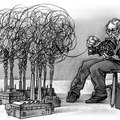STUTTGART, Germany May 14 — DaimlerChrysler confirmed today that it would sell a controlling interest in its struggling Chrysler Group to Cerberus Capital Management of New York, a private equity firm that specializes in restructuring troubled companies. The price being paid is $7.4 billion, mostly in the form of capital that Cerberus will put into Chrysler.
The deal unwinds a 1998 merger that was meant to create a trans-Atlantic automotive powerhouse.
The agreement will leave DaimlerChrysler, of Stuttgart, Germany, with a 19.9 percent stake in Chrysler. DaimlerChrysler will change its name to Daimler AG. It will be freed of a great amount of pension and health care liabilities in the new Chrysler company.
Cerberus will take an 80.1 percent stake in the new company, to be known as Chrysler Holding.
With the deal, Chrysler becomes the first of the big Detroit automakers to be privately owned. The prospect of private ownership had alarmed Chrysler’s labor unions, which had come out strongly against the sale of the company, fearful that an investor might try to break up the company or seek deep cuts in wages and benefits.
But Ron Gettelfinger, the president of the United Automobile Workers union, said today that the deal “was in the best interests of our U.A.W. members, the Chrysler Group and Daimler.”
Of the $7.4 billion, Cerberus agreed to invest $5 billion in the new Chrysler and $1.05 billion in Chrysler’s financial arm. The remaining $1.35 billion will go to DaimlerChrysler.
DaimlerChrysler’s share of the capital represents a remarkable comedown for a company that paid $36 billion to acquire Chrysler in 1998, in a landmark deal that was initially hailed as a blueprint for the future of the global auto industry.
As part of the complicated sale today, DaimlerChrysler has agreed to lend Chrysler Holding $400 million and will absorb $1.6 billion in costs, related to the ongoing restructuring program at Chrysler. All told, the company said, it will have a net cash outflow of $650 million from the transaction.
DaimlerChrysler, however, will transfer nearly $20 billion in pension and health care obligations for Chrysler’s workers to the new company. That will leave Daimler as a smaller, but financially stronger company.
Dieter Zetsche, the chief executive of DaimlerChrysler, said, “We’re confident that we’ve found the right solution that will create the greatest overall value — both for Daimler and Chrysler.”
The chairman of Cerberus, John W. Snow, said, “We would like to thank DaimlerChrysler for their good stewardship of this American icon over the last decade. We are aware that Chrysler faces significant challenges, but we are confident that they can and will be overcome.” Mr. Snow is the former United States treasury secretary.
The deal is expected to be finalized in the third quarter.
The sale would be a watershed for private equity companies, which have become audacious bidders for businesses as varied as retailers, steel companies and airlines in the last few years. But never before has one of them purchased a company as iconic as Chrysler, whose Dodge and Jeep brands are so embedded in the American culture that the company’s near-bankruptcy led to a federal bailout in 1979 that made Lee A. Iacocca, then its chief executive, a household name.
Daimler-Benz of Germany was an eager bidder for Chrysler nine years ago, attracted by its highly profitable lineup of Jeeps and minivans. The combination was originally portrayed as a merger of equals but ended up being a German takeover.
The merger has never resulted in the savings or market power that its creators envisioned, however, as the company struggled to put a mass market brand, Chrysler, together with Mercedes-Benz, a luxury company, while keeping both prosperous.
Chrysler’s fortunes have been on a constant roller-coaster ride, with profitable years followed by years of losses, including a $1.5 billion loss in 2006, when Chrysler fell to fourth place in the American market behind Toyota. (It had a 12.6 percent share of the domestic market in 2006, from a peak of 16 percent in 1999.) Meanwhile, Daimler’s parallel expansion into Asia ran aground because of troubles at its Japanese partner, Mitsubishi Motors. It thought Mitsubishi might serve as the third leg of its global stool when it purchased a stake in 1999. But Mitsubishi’s legal and financial troubles forced Daimler to take management control in 2002, and Daimler ended that alliance in 2004.
In February, DaimlerChrysler announced that it was keeping all of its options open for Chrysler, including a sale or finding a partner to run the company. At the same time, DaimlerChrysler announced a restructuring plan for Chrysler, the second such plan in the last seven years.
Under the latest turnaround, which calls for the company to cut 16 percent of its work force, or 13,000 jobs, Chrysler is not expected to be profitable again until 2009. DaimlerChrysler is scheduled to announce its first-quarter earnings on Tuesday.
Cerberus emerged as the leading bidder for Chrysler late last week, people involved in the transaction said.
Along with Cerberus, other interested bidders in Chrysler included Blackstone, which was exploring a purchase in conjunction with Centerbridge Partners.
Magna International, the Canadian auto parts company, and the Tracinda Corporation, the holding company owned by the billionaire Kirk Kerkorian , also said they had made bids for Chrysler.
Over the last few days, officials at Cerberus and DaimlerChrysler have been involved in detailed discussions, which have been shepherded by JPMorgan, DaimlerChrysler’s investment adviser.
“We’re confident that we have found the solution that will create the greatest overall value — both for Daimler and for Chrysler,” DaimlerChrysler chief executive Dieter Zetsche said this morning. He called the transaction “a new start” for both companies.
Participants in the talks said on Sunday night that union leaders had been informed of the discussions with Cerberus. DaimlerChrysler officials had pledged to discuss any possible sale with Mr. Gettelfinger before it took place, people with knowledge of the talks said.
Chrysler’s unions, including the U.A.W. and the Canadian Automobile Workers, had said they would prefer that Chrysler not be sold. Mr. Gettelfinger has a seat on the 20-member supervisory board at DaimlerChrysler, along with DaimlerChrysler’s unions in Germany.
A deal with Cerberus “puts an enormous amount of pressure on the union,” said David E. Cole, chairman of the Center for Automotive Research in Ann Arbor, Mich.
The union thought private equity “would be the end of the world, and in some ways it probably would be,” Mr. Cole said. “The union is in a horrifying box right now. There’s got to be some real hardball that’s a part of this to get the rank and file to go along with it.”
But Mr. Gettelfinger’s support will go a long way to assuaging Chrysler workers. Indeed, Mr. Gettelfinger said his union was “pleased this decision has been made” because it meant Chrysler could focus completely on its own future.
Cerberus, whose automotive investment operations are headed by David W. Thursfield, a former executive with the Ford Motor Company, will keep Chrysler’s management in place, at least for now, people with knowledge of the discussions said.
“As a private company, Chrysler will be better positioned to focus on its long-term plan for recovery, rather than just short-term results,” said Chrysler’s chief executive, Thomas W. LaSorda.
Mr. LaSorda said no new job cuts were planned by the new owners.
Chrysler executives will leave the DaimlerChrysler management board, which will be reduced to six people.
Chrysler’s former president, Wolfgang Bernhard, who advised Cerberus, may receive a seat on the board of the new Chrysler or play some other role.
Mr. Bernhard visited Chrysler several times in the last few weeks, and has remained friendly with Mr. Zetsche, who ran Chrysler when Mr. Bernhard was president during the early 2000s.
A sale to Cerberus would mark the company’s latest investment in an automotive-related company. Last year, Cerberus, which owns the car-rental companies National and Alamo, led a consortium that purchased a 51 percent stake in the General Motors Acceptance Corporation, the financing arm of General Motors.
Cerberus also reached a tentative agreement to purchase a controlling interest in the Delphi Corporation, an auto parts supplier that used to be owned by G.M. and is operating in bankruptcy. But that transaction stalled, after Delphi and G.M. were unable to agree on contract terms with the U.A.W.
As private equity firms have appeared more often in the headlines, they have also attracted scrutiny. Along with the unions, government officials have expressed increasing concern over the financial restructurings that are the lifeblood of buyout firms; their overhauls of companies have often included massive cuts in jobs or benefits. In countries like Germany and France, private equity firms have been derided as locusts that strip companies of their assets.
Last month the Service Employees International Union , a politically active organization that represents nearly two million workers, released a report expressing public policy concerns about private equity. Among those were questions about the lack of disclosure and about certain tax breaks for buyout firms.
Nonetheless, DaimlerChrysler’s shares have climbed 15 percent, to $82 on Friday, since mid-February, when private equity firms entered the bidding for Chrysler. The shares rose again in early trading today in Europe.
At the company’s raucous annual meeting in Berlin last month, a succession of shareholders stood up to demand that the company move swiftly to dispose of Chrysler.
“This marriage made in heaven turned out to be a complete failure,” said Hans-Richard Schmitz, who represented the German Association for the Protection of Shareholders. “What’s missing now is a swift resolution of the issue by the management of the group.”




